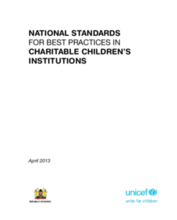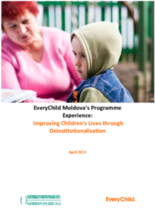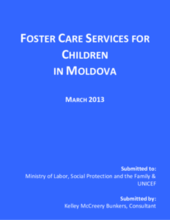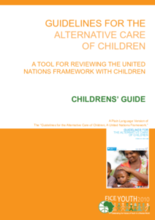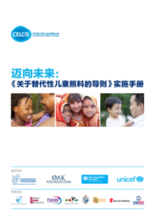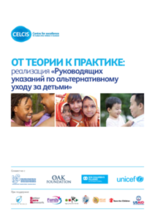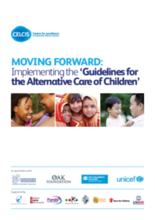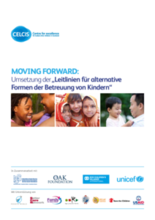Displaying 101 - 110 of 191
This document was developed with the aim of assisting Charitable Children’s Institutions (CCIs) in Kenya to boost their capacity for determining which children need to be admitted into CCIs, how to provide adequate care and protection to the children and how to plan the eventual exit of the children back to their families and communities.
This Program Review documents the evolution of EveryChild/Partnerships for Every Child’s Program in Moldova since 1994, presenting the development of interventions to improve the lives of children through deinstitutionalization and identifying the best practices and lessons that may be relevant, useful, and replicable to other initiatives and organizations around the world.
This new radio report from US National Public Radio (NPR) challenges some of the misconceptions about fostering, including that people foster for the money or that foster parents “must be saints to take in other people’s children”. Two main speakers, a foster parent for over 15 years to more than 40 children, and a Professor at the University of Richmond School of Law share their insight and experiences about fostering in the US context.
This important assessment of foster care services in the Republic of Moldova explores the differences between the two main types of foster care services provided in that country, including in terms requirements and profiles of caregivers and of the children, the legal and policy framework underpinning them, including the legal status of the foster parent, as well as the allowances and benefits for each type of care
This booklet from SOS Children’s Villages International was created for young people to explain in a simple manner the main points of the Guidelines for the Alternative Care of Children approved by the United Nations General Assembly in 2009. The booklet helps its young audience think about the principles of alternative care and what these mean for children and families in different situations.
This handbook (in Mandarin) is designed as a tool for legislators, policy-makers, and all professionals and care providers to support the implementation of the Guidelines for the Alternative Care of Children, endorsed by the United Nations General Assembly in 2009.
This handbook (in Russian) is designed as a tool for legislators, policy-makers, and all professionals and care providers to support the implementation of the Guidelines for the Alternative Care of Children, endorsed by the United Nations General Assembly in 2009.
This handbook, Moving Forward: Implementation of the ‘Guidelines for the Alternative Care of Children,’ is aimed at legislators, policy-makers and decision-makers, as well as professionals and care providers, to support the implementation of the Guidelines for the Alternative Care of Children, endorsed by the United Nations General Assembly in 2009. It explains the key thrusts of the Guidelines, outlines the kind of policy responses required, and describes ‘promising’ examples of efforts already made to apply them in diverse communities, countries, regions and cultures.
This handbook (in German) is designed as a tool for legislators, policy-makers, and all professionals and care providers to support the implementation of the Guidelines for the Alternative Care of Children, endorsed by the United Nations General Assembly in 2009.
This Recommendation by the European Commission on Investing in Children, stresses the importance of early intervention and preventative approaches, and makes quality childcare one of its key policy areas to break the cycle of disadvantage in early years and reduce the risk of child poverty and social exclusion.

